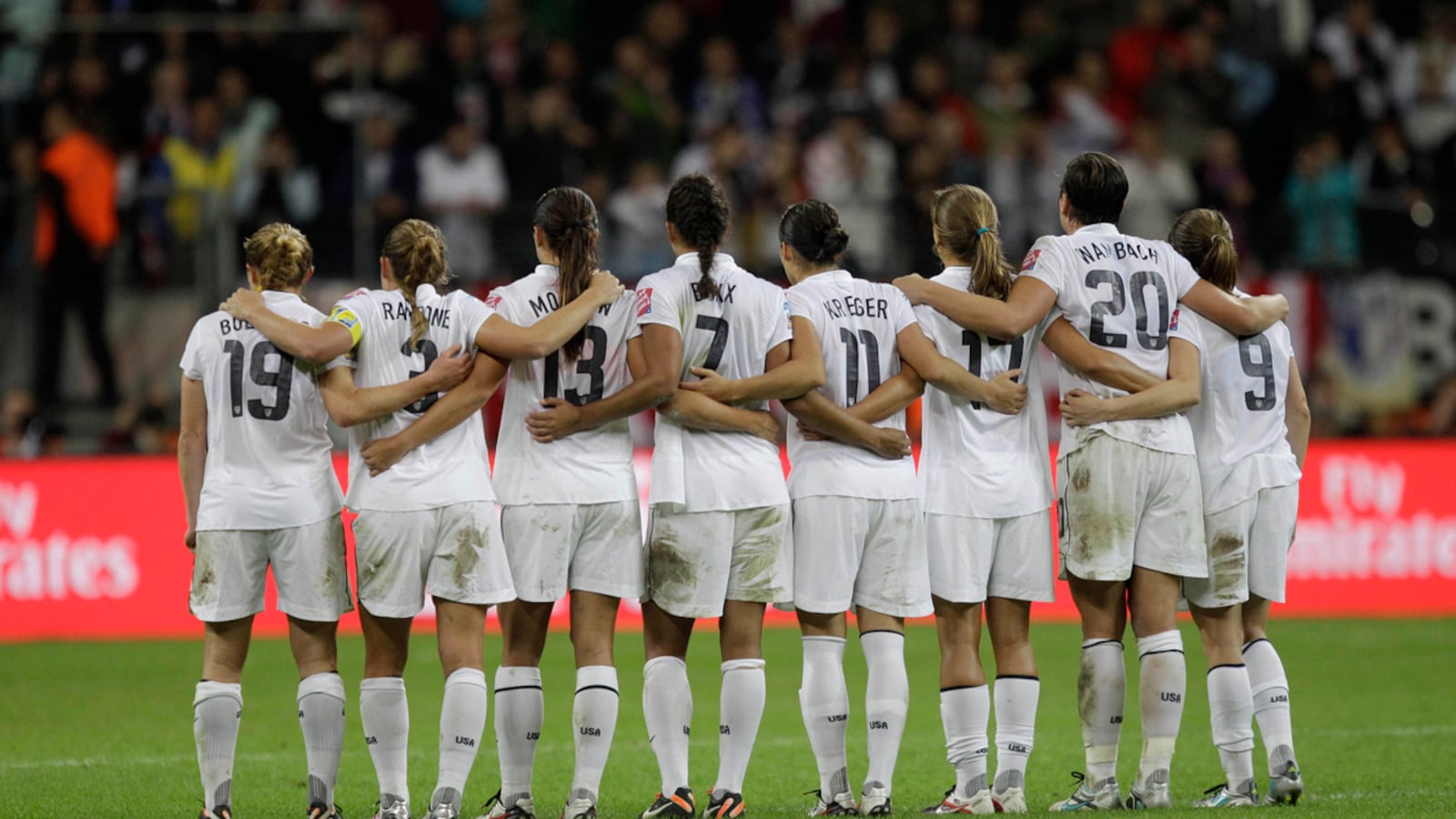My father never watched a soccer game in his life, but all during Sunday’s women’s World Cup final I kept thinking of him. When I was a kid, he thrilled me with his accounts of what it was like to sit in front of a radio and listen to Joe Louis’ knockout of Max Schmeling in 1938. It was the first time, he said, that he felt the American people come together as one, with at least some of them willing to concede that a black man could be an American hero.
The American women’s soccer team made me feel like that all week, and though the loss on penalty kicks was a bitter disappointment, I won’t be losing that feeling any time soon. The so-called Miracle on Ice in 1980, when the U.S. Olympic hockey team beat the Soviets and went on to win the gold, didn’t do it for me. That was partly because, like most Americans, I don’t really care about hockey, and partly because the cause we were supposed to get so worked up about—let’s blame the Soviets for the Iranians taking our hostages, or something like that—seemed a bit contrived.
But soccer, even if we don’t watch it on TV all that much or have any strong connections to the professional game, is a different matter. We all have wives, girlfriends, daughters, nieces, or neighbors who have played it, and by God, they kick butt. They really do.
The American women’s soccer program has laid down a claim for being first class. If our team had pulled off a victory, they would have been our third U.S. World Cup champions in the last six tournaments. For some reason, this is only something we choose to talk about in odd-numbered years; in the even-numbered ones, when the men’s game comes around, we get a blizzard of editorials about how our country’s failure to be a soccer power is some kind of blow to our national pride.
Why is it so easy to forget that we have won two World Cups—in 1991 and 1999? And that the 1999 victory over China is still the highest rated soccer game involving an American team ever?

I don’t think any team has gotten a grip on me like this year’s women’s soccer squad. I’m not absolutely certain why, but let me take as stab at it: I resisted the U.S. hockey mania in 1980 because too many people tried to rally me to what I thought was a phony cause against a bogus external threat. No, even that’s not quite right. The Soviet Union wasn’t a bogus threat, but I just didn’t see how beating their team in hockey was going to do us much good.
This year has been different. The threat comes from within. We’re a country torn apart by partisan politics and ideology, teetering on the edge of financial doom, and our women’s soccer team provided much more than a respite: They gave us a chance to cheer for something together. Can you think of anything else that could do that? I can’t. And despite the hard loss in overtime, I think they accomplished that feat.
Our women bought us together in a way that no professional team ever could. For one thing, they really are amateurs, and there is a kind of nobility attached to amateur athletes giving up so much time and effort for their country, even if they’re going to be making a few well-deserved bucks appearing on Wheaties boxes or David Letterman or even getting the odd sports shoe endorsement.
For another, they have given us, over the last 20 years, perhaps the most unswerving example of excellence against world competition in all of American sports. Let’s go ahead and say it: Abby Wambach isn’t just the best women’s soccer player this country has ever produced, she is, pound for pound, the best soccer player we’ve ever had. Period.
My father said he wept when Joe Louis beat Max Schmeling. In 1938 there were storm clouds on the American horizon, and most Americans felt that war with Nazi Germany was inevitable. Schmeling was German, though at the time we did not know he was not a Nazi. (It was nearly two decades before we found out that he and Joe were actually friends.) There was nothing like that this time around; if anything, the team that beat us carried a burden for national pride and unity even greater than our own. There is crying in soccer, but I saw on TV that our women cried, at least some of their women cried, crowds of Japanese cried, and I cried with them.
So, finally, I felt connected not only to my fellow Americans in a way no sporting event has ever connected me. I also felt, for a while, that I was, well, turning Japanese. (Haven’t felt like that since Hideki Matsui hit that second home run in the final game of the 2009 World Series.)
Sitting down to write this, once more I thought of my father. He was a big Richard Nixon man, and I hated him. Tracy Baim, publisher and executive editor of The Windy City Group, wrote a story for The Huffington Post last Monday, after our women beat Brazil, giving credit where credit is due: “In the nearly 40 years since its passage in 1972,” Baim wrote, “Title IX has been consistently under fire from a wide range of critics.... Watching the women’s World Cup and the incredible U.S. quarterfinal win Sunday against Brazil, I am reminded just how important Title IX has been for the women’s movement and for me personally as a woman.”
And for me—as a father whose daughter played softball despite battling Lyme disease, just as the captain of our women’s soccer team, Christie Rampone, does; uncle whose niece was a star volleyball player; and neighbor, as a supporter of our local high school lacrosse team.
The statistics are staggeringly in favor of Title IX, which since its passage in 1972 has required schools to treat men and women equally. A 2008 study (PDF) indicated that the increased number of women and girls participating in high-school sports had increased ninefold and in college sports almost fivefold from 1977 through 2008. The study also revealed that 98.8 percent of U.S. colleges now have a girls’ basketball team, 95.7 percent have a volleyball team, and 92 percent have soccer teams, which is why you were in front of your TV on Sunday.
When you think about it, Title IX might be one of the most important pieces of legislation passed in this country since World War II. It has made this country a better place to live in, and that sneaky, lying, conniving son of a bitch Richard M. Nixon signed it—with a smile on his face. So this afternoon I tipped my glass to the U.S. and Japanese women’s soccer teams, my father, and Nixon.
Talk about bringing people together.






